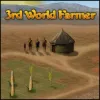Take a look inside 7 images
3rd World Farmer
Pros: Immersive sim connects players with global issues that are hard to grasp without context.
Cons: More real-world connections/source material would help students empathize and understand.
Bottom Line: Players will think seriously about the perpetuation of poverty, but the game's hopeless direction is best paired with primary sources for context, and student activism for a feeling of empowerment.
Assign 3rd World Farmer as homework early on in a longer unit exploring developing nations or current global issues (particularly if looking at parts of Africa, the Middle East, or rural Asia), as well as world history or sociology. The game is better as an entry point than a culminating experience, but don't miss out on the interesting opportunity to use it pre- and post-discussion to see how learners' ideas evolve about what's taking place. A solid way to build on the experience of a sim is to reverse-engineer it as an offline game, folding in aspects that you want students to pay closer attention to. Make "families" or teams with groups of students, add variables as annual events that deepen the context, and consider taking advantage of financially driven game mechanics to enhance lessons about economics. If playing the online version during class, don't forget that a browser is required for each player (no multiplayer option), so it works best in classrooms with a set of computers. You might have students play in groups, and then devise classwide plans to make a difference in world poverty.
As with any digital game you consider, play it first and be sure that the nature of the content suits your learners and your goals, as some of the content can be difficult for younger or more sensitive students. The game is available to play in a number of languages, so it can even reach English language learners (ELLs).
3rd World Farmer is a free browser-based simulation game that drops players in the role plainly described in its title; that is, it simulates the mechanisms that cause and sustain poverty. Sim-savvy gamers will easily recognize simple click-and-drop game mechanics enabling the central character to grow crops, purchase livestock and basic technologies, and build farm infrastructure, such as a barn for your pigs. In each turn, players choose how they'll spend their very modest income and then review the outcome of their harvest months through an annual report. Crops may yield positive outcomes after harvest, but an Event of the Year paints a bigger, usually gloomy picture wherein poachers, disease, civil war, corruption, unreliable markets, and political turmoil threaten the life and livelihood of the farmer and family. Reports of family members contracting illnesses or having babies are also included in the report.
Players begin with a hut, four family members -- two adults and two children -- and $50 to spend on a small arid plot on an unnamed plain. Earnings seem, at first, to be the primary goal, as it's the only conspicuous on-screen metric, but as the game unfolds, it becomes clear that means come second to keeping the family alive. Players may end up focusing on planting enough food and dispensing enough medicine to even make it to the next round. Thought-provoking ethical questions, like whether to earn some extra cash dancing for tourists, are periodically woven in with practical ones, like whether to grow peanuts or invest in chickens. In the end, the very notion of success is put into perspective as students will struggle just to get by in grim circumstances. The Game Over screen foregrounds a link encouraging players to learn how to make a difference through relief agencies, a nod to the game's larger purpose.
Players will learn not only about the costs of doing business -- for example, planting peanuts can be expensive and risky but more profitable if the harvest succeeds -- but also about the greater risks of doing it in a developing country where simple errands can cost family members their lives. The issues are made more generic than in other serious games like Darfur Is Dying, which offers teachers a lot of opportunities to connect to curriculum. The game isn't intended to be a deep investigation into the issues it covers, so students would benefit from connections to primary sources and reporting of contemporary issues. Still, while it has aged quite a bit, it's a surprisingly powerful vehicle to spread the message about the problems of global illiteracy and the uphill battle that these families face, as well as serving as an immersive starting point for longer discussions with students. It's meant to have an emotional impact on players who can't succeed simply by making the "right" choices. Here, it's almost inevitable that you will fail. Fortunately, the game isn't timed, so students can study and contemplate their options, trying to sustain the family and the farm as long as they can.
For the brave educator, the game is also a great opportunity to integrate economics and basic financial literacy with current events and global issues. Breakdowns found in the annual report of elements -- such as crop yield, annual spending, and earnings -- are presented simply but end up being great tools for learning financial vocabulary and analyzing data. Players might have questions like "Why does the price of growing cotton change each year?" which presents ripe inquiry-driven opportunities. The game even offers nine different language options, so kids can play in a different language. The catch is that while the game suits most early teenage learners, the developers don't sugarcoat death, disease, and some unsettling violence and visuals. Though it's almost entirely text-based (a fair amount of reading is involved), the tough stuff comes with nearly every turn, and teachers should prepare to answer unsettling questions.















